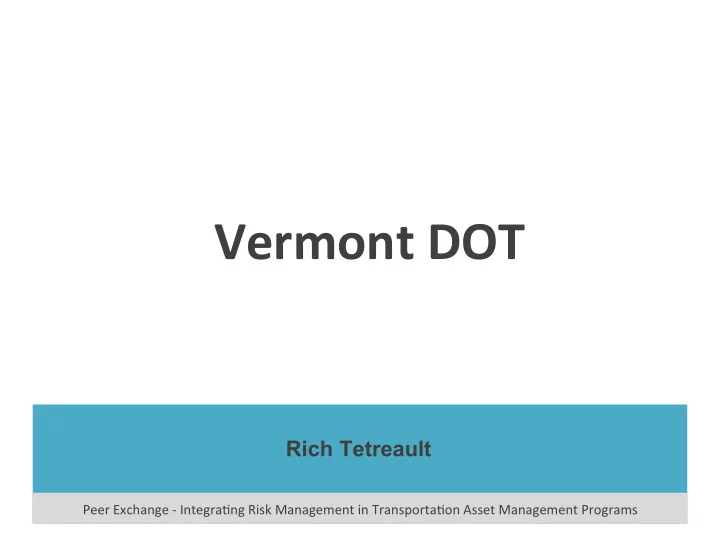

Vermont ¡DOT ¡ Rich Tetreault Peer ¡Exchange ¡-‑ ¡Integra/ng ¡Risk ¡Management ¡in ¡Transporta/on ¡Asset ¡Management ¡Programs Peer ¡Exchange ¡-‑ ¡Integra/ng ¡Risk ¡Management ¡in ¡Transporta/on ¡Asset ¡Management ¡Programs
Peer Exchange – Integrating Risk Management in TAM Programs August 25-26, 2015 Rich Tetreault, Chief Engineer
2
http://vtrans.vermont.gov/sites/aot/files/documents/other/ ExecPolicyStatementsigned042114.pdf 3
Agency ¡ ¡ ¡Goals ¡ Strategic Program ¡ ¡ Objec7ves ¡ Mgmt (Strategic ¡Management) Performance ¡Measures ¡ Asset ( Performance ¡Management ) Mgmt Risk Performance Data ¡Management ¡ Mgmt Mgmt Data: ¡Quality, ¡Standards ¡& ¡Governance 4
5
7
¨ Asset Sustainability ¨ Fiscal Accountability ¨ Organizational Alignment ¨ Credible Programming 8
Develop Risk Management to: ¨ Support the Agency ’ s Strategic Plan ¨ Perform risk analysis processes that are both proactive and reactive ¨ Identify risks to support resiliency effort ¨ Determine how to bridge performance gaps 9
¨ Risk Management Engineer position created and filled ¨ Risk Management Task Force created to support the development of VTrans ’ Transportation Asset Management Plan (TAMP) ¨ Six focus groups convened for risk identification to compile an initial risk register: Bridges, Pavements, Ancillary Assets, Data, Traffic & Safety, and Budget & Programming 10
¡ Total Number ¡ Number Critical ¡ Ancillary Assets ¡ 51 ¡ 1 ¡ Bridges ¡ 36 ¡ 6 ¡ Budget & Programming ¡ 79 ¡ 2 ¡ Data ¡ 27 ¡ 6 ¡ Pavement ¡ 21 ¡ 2 ¡ Traffic & Safety ¡ 84 ¡ 9 ¡ Management/Misc ¡ 2 ¡ 2 ¡ Total: ¡ 300 ¡ 28 ¡ • A total of 298 risk statements were produced, with two more added from management thereafter 11
¡ Pavement ¡ Ancillary ¡ Bridges ¡ Traffic ¡ B & P ¡ Misc. ¡ Total ¡ Data ¡ Asset Mgmt ¡ 1 ¡ ¡ 1 ¡ ¡ 1 ¡ ¡ 1 ¡ 4 ¡ Data ¡ ¡ 1 ¡ ¡ 3 ¡ ¡ 4 ¡ ¡ 8 ¡ Enforcement ¡ ¡ 1 ¡ ¡ ¡ ¡ 1 ¡ ¡ 2 ¡ Finance ¡ ¡ 2 ¡ ¡ 1 ¡ ¡ ¡ 1 ¡ 4 ¡ Leadership ¡ ¡ 2 ¡ ¡ 1 ¡ ¡ ¡ ¡ 3 ¡ Planning ¡ ¡ ¡ ¡ ¡ ¡ 4 ¡ ¡ 4 ¡ Materials ¡ ¡ ¡ ¡ ¡ 1 ¡ ¡ ¡ 1 ¡ Schedule ¡ ¡ ¡ 1 ¡ ¡ ¡ ¡ ¡ 1 ¡ Workforce ¡ ¡ ¡ ¡ 1 ¡ ¡ ¡ ¡ 1 ¡ • Each critical risk was placed into one of 14 identified risk areas from our draft RM plan 12
Key Risk Indicator Status Trend KRI 1 KRI 2 KRI 3 KRI 4 Possible Key Performance Indicators: • Number of systemic risks identified • % of program and process areas involved in risk registers/assessments • % of key risks monitored • % of key risks mitigated 13
Rivers Roads 14 14
Topsham, VT 1907 vs. 2007 15
Only half-way through this 5 year period 16
17 17
Tropical Storms/ hurricanes Tornado Floods Snow/Ice Oxidation Earthquake Freeze/thaw Rock slides 18 18
¨ The Tier One training module can be accessed through the following link: https://training.fema.gov/is/courseoverview.aspx?code=IS-100.b ¨ The class is expected to take approximately 2.5 to 3 hours to complete, and it is free of charge. ¨ This training is required for ALL employees and is expected to be completed within the first 30-days of hire. 19
¨ The Tier One training module can be accessed through the following link: http://wsmd.vt.gov/ rivers/roadstraining/ ¨ The class is expected to take approximately 1.5 to 2 hours to complete, and it is free of charge. ¨ This training is required for engineers, technicians, equipment operators, highway foreman and others. It is also available to any others who might be interested in learning more about how river systems work. 20
Vermont ’ s old manual focused on hydraulic capacity of structure (water only). The new manual will employ a “ river science ” approach and consider hydraulic capacity, sediment and debris. The new manual will likely allow for more risk based design in terms of roadway safety and stream stability. A structure on a town road with an ADT of 2000 over an unstable channel will be designed differently than a town road structure with an ADT of 20 over a stable channel. The new manual will parallel language in the latest stream alteration permit. This will make the process clearer to people unfamiliar with the design and permitting process (FEMA). 21
2007 2003 22 22
Process-based approach to identify and prioritize risk in river- 8 of 11 damage sites in Rt. 100 roadway corridors: corridor are associated with highest levels of river shear stress (i.e., erosion 1. Hydrologic and hydraulic potential). modeling (HEC-RAS) to quantify river and floodplain erosion potential. 2. LiDAR slope mapping to identify slopes >100% in between roadway and river. 3. Identify areas of roadway with limited relief from river that are susceptible to erosion during flood events. 23
Images of the Greenland Ice Sheet near Kangerlugssuaq in west-central Greenland taken by a drone (UAV) used to evaluate the evolving albedo of the ice sheet surface during the summer melt season. Credit: Photos courtesy of Johnny Ryan, Aberystwyth University, Jason Box, GEUS, and the Dark Snow Project. 24
25
Recommend
More recommend